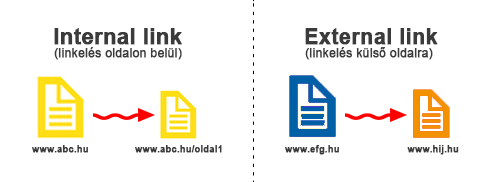Linking inside and outside the site - opportunities, risks, results | Weboptim
An important part of any website's network of links are links within the site and links out of the site. However, it is worth considering who you link to and what kind of link you provide from your site.

A, When linking to an external website or pages
Let's say you have a mobile comparison site, in which case it's a very good idea to go to the official website for each type of mobile phone.
Either we get affiliate value for the link, or someone pays us in return, or we link to link to a site that we own or that is related to ours and we want to take advantage of that.
So good outbound links can increase the relevance of your site, which has an impact on the rankings that search engines give you.
The pages we link to usually link backwards. After all, if our link is useful and relevant, it can better serve the needs of users, and this often means a direct link as it drives traffic to the other website, who is more likely to link back to us.
However, manipulative linking can be dangerous. In the following cases criminal a Google:
- the link comes from the wrong place
- link to the wrong place
- we link to the right place, but for the wrong reason (if someone pays us and we want to profit from it. )
Google made an announcement a few months ago that if bloggers receive free products from companies and then link to those products, they will be penalized if there is not an ad or sponsored post next to it.
B, Linking within the site or to sites that we own
Let's go to the inside pages.Let's stick to the mobile comparison example. We want to link to our own site, for example with a video. We want to ensure navigation. We want to help visitors find what they are looking for.
Not only can it help you index and crawl pages, it can also help you rank them. So good internal links can have a big impact on the performance of the whole website.
Internal links usually perform well, driving traffic and shortening the path of visitors. They help people find the information they need. However, they may not drive traffic because users don't find them useful and so have little impact on the results of the page.
But it's also true that internal links have the biggest impact when your site is already a recognised, authoritative site. If we are already a strong site, linking can help us to make our deep site structure more crawlable.
Manipulative links, such as linking to your own LG subpage for every LG word, don't really work. I'm sure everyone has encountered this kind of linking on websites, it was a common tactic a few years ago and Google didn't penalize you for it then.
Manipulative internal links, especially those that appear in the footer or for every word, are not looked upon favourably by Google. After all, they are not done in the interest of the user. We hope that this will improve the ranking of the page.
As a general rule of thumb, if you can't find any way to justify that you're doing it for the visitor, don't do it.
Often these links are placed in an area within the page that is not clickable by users, more often it is in the sidebar, the navigation menu or in any content, the latter being a dangerous place because of the link text, but not the only one that Google penalises.
Summary
Linking to an external site:
- Good, valuable outbound links can increase relevance and improve rankings.
- They redirect traffic to other sites, who then prefer to link to us.
- Manipulative links (to a low-quality site, to a good site but without justification) can hurt rankings.
Linking within a page:
- Good internal links can have a positive impact on indexing and rankings.
- Internal links that drive traffic and follow the user's path or provide useful information are the most useful.
- Manipulative internal links (in footer, for each word, in certain areas of the topic) that do not lead to clicks can negatively affect rankings and result in penalties.
So there is no clear "never do it, always do it" solution. You should always think carefully, and this applies to internal links as well as external links.
Source: moz.com